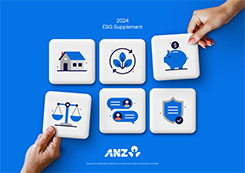Buying your next home?
See our home loan tools, articles and resources to help you explore your home loan options. We'll help you get to a good place.

Buying your next home?
See our home loan tools, articles and resources to help you explore your home loan options. We'll help you get to a good place.
Fraud protection.
Now it’s personal.
ANZ Falcon® technology monitors millions of transactions every day to help keep you safe from fraud.
Falcon® is a registered trademark of Fair Isaac Corporation.
ANZ has set targets for 2025 and 2030. The targets aim to reduce our operational footprint in line with our purpose to support household, business and financial practices that improve environmental sustainability.
Our target is to, not only reduce our combined scope 1 and 2 emissions by 85% by 2025, but to extend our commitment to a further reduction to 90% by 2030 (against a 2015 base year). We aim to achieve these targets through the efficient consumption of energy within our buildings, including commercial offices, retail branches and data centres.
In September 2019 we signed up to RE100, a global initiative driving the transition to 100% renewable electricity.
As an Australian headquartered company, we are aware of the risks associated with drought and water scarcity. We focus on best practice in the design and operation of our commercial and retail facilities by installing eco-efficient water fittings such as low flow aerators on taps and dual flush toilets in our premises.
*against a 2017 baseline
We're seeking to minimise the amount of waste generated and reuse or recycle as much as possible. We'll achieve our target through a reduction in paper consumption and encouraging employees to recycle (e.g. donating used furniture and equipment to local organisations).
*against a 2017 baseline
We're committed to minimising paper use in our offices and materials generated for our customers (e.g. statements and marketing materials). We'll achieve this through a number of initiatives, including encouraging customers to receive electronic communications and improving employee awareness of printing behaviours.
* against 2015 baseline
We seek to minimise the use of resources in our operations through the efficient consumption of energy within our buildings, including commercial offices, retail branches and data centres. We also encourage staff uptake of technology such as video conferencing to reduce emissions associated with travel.
To ensure we're meeting our emission reduction goal we have adopted a framework of:
All efforts to reduce energy consumption across our operating portfolio will assist us in reducing our emissions footprint and achieving our greenhouse gas emissions reduction Target.
Our aim is to reduce emissions where possible, however, remaining emissions are offset in accordance with our certifications under the Australian Government's Climate Active Program and Toitū’s net Carbonzero Program. Our Australian operations have maintained a carbon-neutral certification under the Climate Active Carbon Neutral Standard for Organisations since 2010, and New Zealand operations have been certified under a net Carbonzero certification through Toitū Envirocare for the first time in 2023.
Further information is available below.
Case studies:


This report provides stakeholders with information on ANZ's focus on bringing our purpose to life through elevating areas facing significant societal challenges aligned with our strategy and reach. It includes performance against our ESG targets and our management of material ESG issues. Released 8 November 2024.
2024 ANZ ESG Data and Frameworks Pack
Our 2024 ESG Data and Frameworks Pack includes ESG performance data (and comparatives) and how we have reported against international ESG reporting standards and frameworks. Released 8 November 2024.
ANZ's Social and Environmental Sustainability Target Methodology. Updated 8 November 2024.
Our 2024 Climate-related Financial Disclosures outline progress towards implementing our Climate Change Commitment and how we have been supporting our customers to date. This lays the foundation for us to deliver on our five-year Climate and Environment Strategy, approved in October 2024, to support an effective and orderly transition in coming years. Released 8 November 2024.




